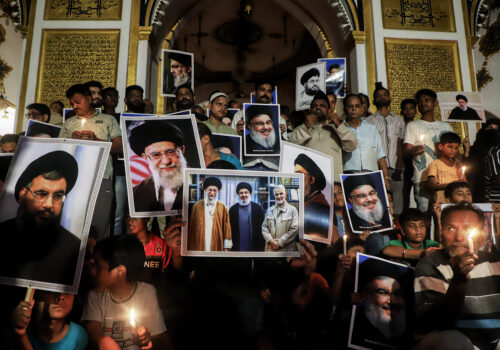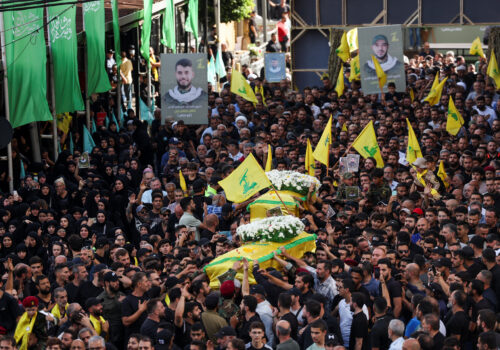Iran has a strategy for Israel. Now Israel needs one for Iran.
Since Hamas’s horrific October 7, 2023, assault on Israel, Iran has supported the group by orchestrating attacks on the Jewish state from Iran’s other Resistance Axis allies—Hezbollah in Lebanon, Shia militias in Iraq, and the Houthis in Yemen. The attacks against Israel during the past year represent the latest stage in Iran’s long-running war of attrition strategy against the Jewish state, aimed at bringing about Israel’s destruction. Hamas’s war with Israel in the Gaza Strip and the almost continual attacks against Israel from Iran’s other proxies demonstrate the effectiveness of Tehran’s strategy of arming and training like-minded militias, whose military capabilities provide the Islamic Republic strategic depth and largely have allowed it to avoid a direct military confrontation with Israel.
Iran’s proxies threaten Israel with a “ring of fire” aimed at stretching the Jewish state’s resources and weakening its morale by forcing it to fight on several fronts at once. Hezbollah’s daily rocket and drone attacks into northern Israel, beginning on October 8, 2023, have led to the evacuation of some 70,000 Israelis from their homes in the north and forced Israel to keep a significant number of forces on its northern border to counter the threat. The Houthis’ missile attacks against Israel have essentially shut down Israel’s Red Sea port of Eilat, while their attacks on international shipping through the Red Sea have led to a more than 50 percent drop in ship traffic through the Suez Canal, causing shipping companies to make the longer, costlier trek around the Cape of Good Hope. Iraqi Shia militias have also targeted Israel with missiles and drones—hoping to drive the United States, whose support for Israel these groups see as key to Israel’s survival, from the region, and have conducted around 170 attacks against US forces in Iraq and Syria. Iran also has sought to smuggle large quantities of weapons into the West Bank to enable attacks on Israeli forces there by Palestinian militants.
Israel has tactical military dominance but needs a political strategy
Israel has demonstrated great tactical proficiency in working to destroy Hamas’s military capabilities in Gaza, as well as in responding to ongoing attacks from Iran’s other Resistance allies as Israel seeks to undermine Iran’s regional presence and reestablish deterrence. Israel has destroyed a large part of Hamas’s fighting force, armaments, and infrastructure, and it has killed senior military leaders in Gaza, limiting Hamas’s ability to carry out organized military operations. Israel has also successfully stepped up its attacks on Iranian and Hezbollah weapons convoys, arms depots, and missile factories in Syria and increasingly targeted senior Islamic Revolutionary Guard Corps (IRGC) officers operating in Syria. An Israeli airstrike killed Hezbollah second-in-command Fuad Shukr in Beirut on July 31, and a bomb in his guest house killed Hamas political leader Ismail Haniyeh in Tehran the following day as Israel has sought to demonstrate the extent of its reach and ability to dominate the battlefield.
SIGN UP FOR THIS WEEK IN THE MIDEAST NEWSLETTER
Since mid-September, Israel has dramatically increased its operations against Iran’s most powerful ally, Hezbollah—disrupting the group’s communications systems by causing thousands of members’ pagers and walkie-talkies to explode and conducting airstrikes that killed dozens of senior and mid-level Hezbollah commanders and destroyed hundreds of launch sites and weapons depots. Israel capped this campaign with an airstrike that killed Hezbollah leader Hassan Nasrallah, whose death is a major blow to the militant group. Nasrallah, who led the organization for over three decades, is credited with masterminding Hezbollah’s rise to political and military preeminence in Lebanon, as well as its evolution into a potent threat to Israel and a virtual partner to Iran. Nasrallah is widely revered among Hezbollah rank-and-file and across the region for his leadership of the resistance to Israel and had close ties to Supreme Leader Ayatollah Ali Khamenei and other Iranian leaders.
Israel has shown its capabilities not only in its offensive operations but also in defending itself from attacks. When Israel’s killing of senior IRGC officials in Damascus on April 1 drew an unprecedented direct attack from Iran two weeks later, Israel’s air defenses, with help from the United States and several Arab countries, shot down almost all of the roughly 300 missiles and drones Iran launched at the Jewish state. And when Iran retaliated against Israel on October 1 for the killings of Haniyeh and Nasrallah with a barrage of some 200 missiles, Israel’s defenses, supported once again by a US-led coalition, prevailed, resulting in minimal damage to property and loss of life.
Israel has promised to respond to Iran’s latest attack and said that its targets could include Iran’s nuclear and oil facilities. Israel has demonstrated the capacity to evade Iran’s air defenses, and it can undoubtedly fulfill Israeli Prime Minister Benjamin Netanyahu’s vow that its retaliation will be “painful” for Iran. However, Israeli leadership must combine its tactical military prowess with clear political objectives to prevail in this struggle. As Chinese military strategist Sun Tzu noted, “Tactics without strategy is only the noise before defeat.”
An Israeli political strategy to counter Iran could begin with securing a ceasefire in Gaza, the return of the hostages, and, once the war ends, a transition plan for Palestinian governance under a reformed Palestinian Authority and the rebuilding of Gaza. Prolonged Israeli occupation, or chaos following Israel’s withdrawal from Gaza, risks allowing Hamas to revive or sustain an insurgency and boosting Iran’s influence in the region. Iran will be able to stoke the Arab street’s anger at Israel over the high Palestinian death toll, helping keep Arab states’ relations with Israel under strain. Only an Israeli commitment to Palestinian civilian governance and a long-term process leading to Palestinian statehood will secure Arab participation and funding for post-war Gaza, which can diminish Iran’s standing and ability to meddle in the region.
Securing Arab buy-in on the way forward in Gaza would also open the way toward renewed negotiations with Saudi Arabia on normalization with Israel. The normalization of relations with Saudi Arabia is key to Israel’s inclusion in a regional political, economic, and security order capable of counterbalancing Iran and curbing Iran’s regional appeal and clout. The participation of several Arab states in helping to neutralize Iran’s barrage of missiles and drones against Israel in April provides a foreshadowing of how Arab states and Israel could work together to counter military threats from Iran.
Israel’s recent escalation in its attacks upon Hezbollah, particularly the killing of Nasrallah, have dealt a severe blow to Hezbollah’s military capabilities—providing Israel an opportunity to achieve its stated objective of compelling the group to halt its attacks on northern Israel and pull its forces back from the border, allowing Israelis to return to their homes in the north. Israel continues to press its advantage with ongoing airstrikes against Hezbollah targets and a ground incursion into southern Lebanon to clear Hezbollah fighters, destroy the group’s infrastructure near the border, and further erode the group’s capabilities to attack northern Israel. However, despite Israel’s success in eliminating many of Hezbollah’s top commanders and targeting its weapons stocks, the group remains a dangerous foe with substantial rocket and missile stocks still at its disposal and many thousands of forces under arms who have trained to repel an Israeli ground campaign. An Israeli offensive increases the prospect of further losses by Hezbollah—but heightens the risk that Israel could suffer a setback as well.
Instead of further escalating its attacks, Israel’s military gains provide the opportunity to support diplomatic efforts in achieving a political solution. US envoy Amos Hochstein and other diplomats have been trying for months to negotiate a halt to the fighting in which Hezbollah would withdraw its forces north of the Litani River, about fifteen miles from the border with Israel. For a settlement to hold, it would need to include a plan for a strengthened United Nations force to police the area south of the river and ensure compliance. Israel’s exclusive focus on “killing its way to victory over Hezbollah” in the face of calls from the United States and European and Middle Eastern countries for a ceasefire risks increasing frictions with the United States, further isolating Israel and involving the Israeli military in “an extended offensive with ill-defined objectives prone to mission creep.”
Israel’s devastating assault on Hezbollah strengthens the diplomats’ leverage by making it clear to the group and its Iranian patron the consequences of not acquiescing to an agreement. Even if a political solution does not emerge, Israel can use an interim period without fighting to prepare for the conflict that may come and to repair regional and international ties that it can draw on in any future conflict.
Securing broader cooperation against Iran and its proxies—Gaza remains the key
More broadly, dealing with the threat from Iran, including its advancing nuclear program and the ongoing threat from its Resistance Axis, is not something that Israel can do on its own. But ending the war in Gaza with a plan for reconstruction, moderate Palestinian leadership, and ultimately, statehood can help Israel elicit the regional and international support it needs to deal with these challenges. Such a plan would open the way for Arab state engagement with Israel that could counterbalance and isolate Iran and its militant allies. It can also begin to ease criticism of the Jewish state from the United States and rehabilitate its standing in the international community—which has suffered a sharp decline due to the high number of Palestinian civilian casualties and large-scale destruction caused by its military campaign against Hamas. Israel’s relations with the United States have suffered because of the perception by the Joe Biden administration that Israel has not taken sufficient care to avoid killing civilians and that Prime Minister Netanyahu may be prolonging the war to avoid fracturing his coalition and losing power. And both Democratic presidential nominee Kamala Harris and Republican presidential nominee Donald Trump have indicated that they want Israel to bring the war to a close.
Iran is pursuing a long-term strategy to keep Israel under pressure, to provoke Israeli aggression that will generate regional and international backlash, and to weaken the Israeli people’s will to fight. Israel has made progress in weakening Iran’s “ring of fire” and restoring deterrence because of its military successes. But the Jewish state needs a long-term plan that can secure regional cooperation, rehabilitate its international image, maintain the support of the United States, and give the Israeli people hope of a future without endless war.
Alan Pino served as the Group Chief in the Office of Near Eastern and South Asian Affairs at the Central Intelligence Agency and as the National Intelligence Council’s Officer for the Near East, retiring in 2020.
Further reading
Tue, Oct 1, 2024
Hezbollah c’est moi: The Party of God without Hassan Nasrallah
MENASource By David Daoud
The person and the position became synonymous.
Thu, Aug 29, 2024
Which side will Arabs take in an Iran-Israel war?
IranSource By Arash Azizi
Despite building a Resistance Axis, Iran will not enter with a good hand in any conflict that pulls in its Arab neighbors.
Thu, Sep 19, 2024
Israel’s communications attacks push Hezbollah into an uncomfortable corner
MENASource By David Daoud and Natalie Ecanow
Hezbollah has no choice but to retaliate—but the group is unlikely to declare a full war given its constraints.
Image: People look at apparent remains of a ballistic missile lying in the desert, following an attack by Iran on Israel, near the southern city of Arad, Israel October 2, 2024. REUTERS/Amir Cohen TPX IMAGES OF THE DAY



